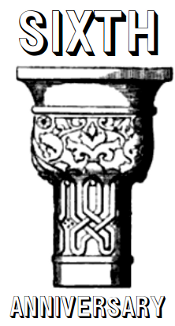 No. 9.—Pasquino of Rome: Seven Books of Useful Improvements.
No. 9.—Pasquino of Rome: Seven Books of Useful Improvements.
WE KNOW OF Pasquino’s work from the transcripts of his trial, in which a number of the “improvements” he published were described in some detail. It is often said that Pasquino was an inventor far ahead of his time, and indeed the list of his inventions justifies that popular opinion of him. A few of his more notable ideas are given here in summary form, as we have taken them from the trial reports:
A kind of drinking vessel made of paper, which may be used once and then discarded.
A method of bending a certain length of wire in a prescribed pattern, so that it may be made to hold a small number of sheets of paper or parchment together with perfect security until such time as it becomes necessary to separate them.
A kind of food which may be chewed indefinitely without swallowing, and which also provides indescribable delight by producing a kind of bladder or bubble when inflated with the mouth.
A device for measuring the time during which a carriage is left at a particular location, said device also exacting a set fee for every quarter-hour during which the carriage is left there.
A kind of chitarra or vihuela which, by the application of the remarkable properties of certain electrical substances, may be increased in volume of sound so much that an entire neighborhood may be entertained with its playing.
A paper container or package for private letters, which may conveniently be sealed by an adhesive applied in advance to the package, and moistened with the tongue when it is required to seal the letter.
A type of handkerchief made of very thin and fine paper, which may be used once and discarded, and which may be stored in large quantities in paperboard boxes designed for the purpose, in such a way that, when one handkerchief is plucked out, another handkerchief presents itself as ready for the plucking.
Having heard detailed testimony on many of Pasquino’s “improvements,” and having seen a number of demonstrations, the court of the Inquisition agreed that they were indeed works of the devil, powered by a supernatural alliance with demons. All copies of the book were burned, and Pasquino himself, as his agreed-upon penance, spent the rest of his life writing commentaries on the extensive works of St. Stolidus, and indeed died at his desk many years later, having completed more than six thousand pages of commentary. This latter manuscript is preserved in the Vatican library, but the card in the front cover reveals that no one has ever checked it out.